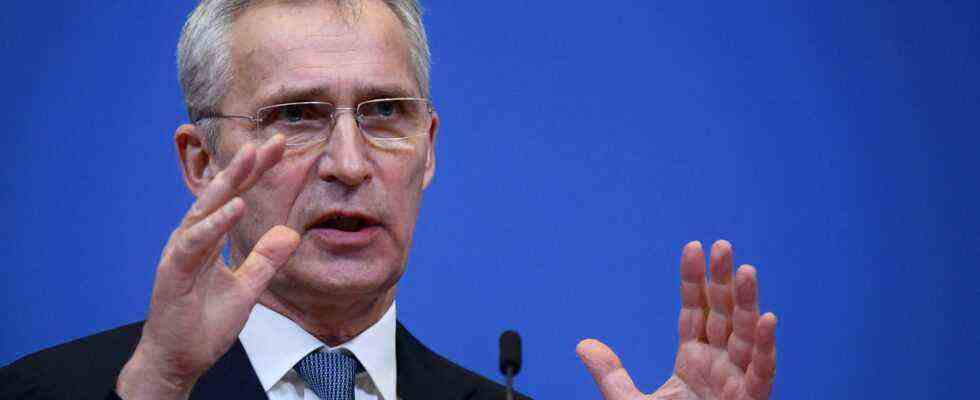Status: 01/25/2022 1:34 p.m
Russia claims that NATO would break old agreements with an eastward expansion. From the West’s point of view, it has long been proven that there has never been a formal waiver. Nevertheless, Ukraine’s NATO membership is out of the question in the foreseeable future.
“Each country has the right to choose its own path.” That’s what NATO Secretary General Jens Stoltenberg sounds like at every opportunity these days. It is of course about Ukraine, which would rather join the western defense alliance today than tomorrow. The country feels threatened by Russia – and for good reason. After all, the big neighbor in the east has been gathering tens of thousands of soldiers and heavy weapons at the border for weeks – allegedly for fear of a Ukrainian attack.
“Absurd Accusation”
Stefan Meister, an expert on Russia and Ukraine at the German Council on Foreign Relations, can’t understand that, to put it mildly: “I think it’s a rhetorical ruse, like the one we know from Russia, that you basically do what you does it himself, blames the other side.”
Russia annexed Crimea, started a war in Donbass, stationed more than 100,000 soldiers on the border with Ukraine, and basically encircled Ukraine militarily. “And now Russia is accusing Ukraine of attacking Russia. Ukraine has no such interest and would not be able to do so. So it’s an absurd accusation.”
Kremlin sees aggressors in the west
At NATO headquarters in Brussels, too, it is repeatedly pointed out that Russia shares less than a sixteenth of its more than 20,000-kilometer land border with NATO countries, and that only five of Russia’s 14 direct neighbors belong to the western alliance.
As expected, the Russian perspective is completely different. The Kremlin sees the aggressors in the West. Led by the US, NATO is arming Ukraine and stationing offensive weapons there, according to Moscow sources. NATO troops in former Warsaw Pact member countries such as Poland and the Baltic States are also a thorn in the side of the Kremlin.
After all, Russian President Vladimir Putin has been accusing the Western alliance for years of working its way towards Russia – and thus breaking agreements from the early 1990s. From the point of view of NATO, it has long since been proven that there was never a formal renunciation of any eastward expansion – which was later confirmed by the then Soviet head of state, Mikhail Gorbachev.
“Decide your own destiny as a sovereign country”
In any case, Ukrainian Deputy Prime Minister Olha Stefanishyna is certain: which alliance Ukraine wants to join is none of Moscow’s business. “We have the right, as a sovereign country, to decide our own fate. Euro-Atlantic integration is part of the constitution and is supported by the majority of citizens. It can therefore not be a bargaining chip.”
This attitude is expressly shared by NATO and all member states. “We support Ukraine on its way to membership, with reforms and meeting NATO standards. And we said very clearly that it is up to Ukraine and the 30 NATO allies to decide whether to join. Nobody otherwise they can have a say, and Russia certainly has no right of veto,” says Secretary General Stolenberg.
Lithuanian Foreign Minister Gabrielis Landsbergis, an outspoken critic of the Kremlin, agrees and recalls that NATO opened up a clear prospect of accession for Ukraine and Georgia at the 2008 summit in Bucharest, just like the Western defenses’ “open door” policy -Alliance envisages from the start. “Russia demands that Ukraine and Georgia, even Finland and Sweden, do not join NATO. NATO’s answer is clear: the door will never be closed,” Landsbergis said.
Joining NATO is currently out of the question
But one thing is just as clear: In view of the smoldering civil war in the east of the country and the dispute over the Crimean peninsula annexed by Russia, Ukraine’s NATO membership is currently out of the question. Stefan Meister, an Eastern Europe expert at the German Council on Foreign Relations, says: “If so, then that’s a long-term thing that’s not on NATO’s agenda at all.”
It is not an offensive NATO policy. “The accusation is always that NATO is systematically encircling and attacking Russia – but it is in the interest of the countries themselves to become part of NATO. And NATO finds it difficult to accept states that have conflicts on their territory in which Russia is involved to ‘let in’ into NATO.” That won’t happen in the foreseeable future either.
The NATO Secretary General is also convinced of this, despite all declarations of solidarity with Ukraine. He sees no contradiction in this with the Alliance’s open-door principle. “You have to differentiate,” says Stoltenberg, “between a political principle and the question of whether Ukraine can become a member in the near future. That’s something completely different.”
Russia, NATO and the (eternal) dispute over eastward expansion
Stephan Ueberbach, SWR Brussels, 25.1.2022 12:35 p.m

